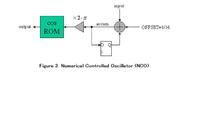anand37
Newbie level 4

- Joined
- Jan 22, 2008
- Messages
- 5
- Helped
- 0
- Reputation
- 0
- Reaction score
- 0
- Trophy points
- 1,281
- Activity points
- 1,329
please can any one give me the vhdl codes for the phase accumulator and the LUT(look up table) required in a numerically controlled oscillator.







